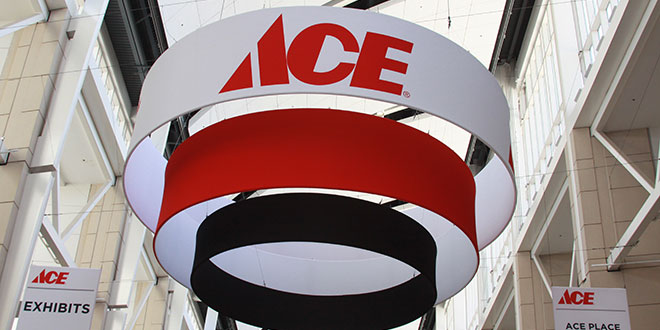 Mark Spanswick, the new president and general manager of Ace Wholesale Holdings, spoke with Hardware Retailing about his nearly three-decade career with Grainger Industrial Supply and his current work of combining Ace Hardware’s wholesale business acquisitions into one growing company. Grainger is a publicly traded, business-to-business supplier. Spanswick began leading the Ace wholesale division March 13.
Mark Spanswick, the new president and general manager of Ace Wholesale Holdings, spoke with Hardware Retailing about his nearly three-decade career with Grainger Industrial Supply and his current work of combining Ace Hardware’s wholesale business acquisitions into one growing company. Grainger is a publicly traded, business-to-business supplier. Spanswick began leading the Ace wholesale division March 13.
Ace bought Emery-Waterhouse Co. in 2014 and Jensen Distribution Services in 2015 to offer wholesale distribution on the East and West coasts. The co-op also started Emery Jensen Distribution in 2015 to serve wholesale customers in mid-America. The three companies together actively serve about 5,000 customers, which include hardware stores, grocery chains, lumberyards and lawn and garden businesses.
Hardware Retailing (HR): What skills and experience do you have that make you uniquely qualified to lead Ace Wholesale Holdings?
Mark Spanswick (MS):
I came from Grainger Industrial Supply and really spent my whole career there to this point. I started out in operations and ran a number of different areas within operations.
I spent quite a bit of time in sales, as well, not only as an account manager but moving up into sales leadership and ultimately running a region. I also managed complex strategy work to establish long-term plans and a vision for the branch network.
Building leadership skills over that period of time was really important. Throughout my 27 years with Grainger, my leadership experience continued to get progressive in terms of leading more people, leading bigger teams, culminating with my final role as a regional sales vice president leading more than a dozen sales leaders, 125-plus account managers and $300 to $400 million in revenue.
I also spent a few years working on mergers and acquisitions for Grainger and was involved with numerous acquisitions and integrations. Acquisitions and integrations can be extremely complex; these business experiences at Grainger have given me a sense of the Ace Wholesale holdings business and the unique opportunities and challenges we are now working through.
HR: What attracted you to Ace Hardware?
MS: As a customer, the Ace brand, as well as the Ace experience, was second to none. It was always very impressive and I always enjoyed being a customer of Ace. I’ve been a loyal Ace customer for more than 25 years.
When I started looking for opportunities and got connected with Ace, it was very reassuring to know that Ace had such a strong brand and was such a leader in the hardware market. I was impressed by their results-focused culture and strong executive leadership team.
HR: What long-term plans do you have for Ace Wholesale Holdings?
MS: The growth of the company is our first priority. We plan to do that by investing in our sales team. Having feet on the street in front of our customers, showcasing the benefits and differentiators of our business, is extremely important to us.
The second thing is, you have to build a culture of phenomenal customer service. You have to have people thinking of the customer first and always putting the customer in any decision, any direction that you go. You have to build that into the culture.
We will continue our focus on having the best logistics network in the business. Being able to leverage Ace’s distribution network does a couple things for us. It puts product closer to customers and it also allows us to have a much broader assortment of product. Because of that, we can deliver products for our customers at the lowest total cost. That is what’s going to differentiate us from our competition.
HR: What changes might Ace retailers notice soon?
MS: Really, there is no impact to the Ace retailers, because we’re not servicing the retailers. But they do get some benefit as a result of this. They’re going to get a larger assortment SKUs because we are bringing in SKUs to support our customers above and beyond what Ace already carries today. That also gives us more buying power with suppliers, which helps us reduce costs. The two things that Ace retailers will notice are a larger SKU assortment and lower costs. Those are some side benefits for the Ace retailers, but that’s not the primary focus.
HR: What are some short-term goals you have for Ace Wholesale?
MS: For the short term, we have to grow the business, which we’re doing. We are on target to grow the business at least 5 percent this year.
We also have to be focused on integrating Emery-Waterhouse and Jensen, the two companies that we acquired. We’re in the process of integrating Emery-Waterhouse, and that will continue to be a priority in the short-term. Our ultimate goal and objective is to be one organization and not to have three separate companies. Integration will be essential for us to further drive costs down, offer a broader SKU assortment and place product closer to our customers.
As we integrate these companies, we will be combining under one name and that name is going to be Emery Jensen Distribution.
HR: How much will restructuring Ace’s East Coast distribution network contribute to the wholesale division’s growth?
MS: That’s been planned for and is part of integrating the businesses. Ace is a distribution company, and like any great distribution company, they do ongoing network analysis to understand, do we have distribution centers in the right place? Do we have the right number? The right size? The network analysis determined that we could close the two Emery locations and open up a much larger Ace facility. It will be much more efficient for our customers and carry more SKUs.
It’s all part of the plan to be able to carry more SKUs and get product closer to our customers, ultimately leading to lower total cost for our customers. It is a significant step in integrating Emery and Jensen.
The only other distribution center that we have under Emery-Waterhouse and Jensen is the one in Spokane, Washington. At this time, there is no plan to close it; instead, it will fold into the existing distribution network.
HR: What are some areas where the wholesale division is particularly strong?
MS: I’ve got to give Ace a ton of credit in terms of the companies they’ve acquired because not only are the two companies situated geographically in very strategic areas for us, but the expertise and specialty that each one brings is different and that allows us to round out a really significant offering for our customers that just isn’t available in the market today. That’s a tremendous differentiator for us.
Emery’s strength is around the professional lumber customer, paint and sundries business. Those two customer segments have been key and critical for their growth. When you look at Jensen, their success has been centered on independent hardware, as well as the online retailers. When you bring those four together, it gives you tremendous leverage, power and synergy across all of what will be Emery Jensen that just doesn’t exist today in the market. So we will be able to build a value proposition that’s going to be really strong for our customers.
Emery and Jensen really are regional players. If you think about pro lumber, Emery has the northeast just rock solid. If we can take that same value proposition that has secured the northeast for them, propagate that out across the country, that’s a great model for growth for us. And that’s what we’re going to do. So we’ll leverage those strengths that exist today from the two companies we acquired.
HR: What areas need to improve?
MS: The immediate areas are integration related. When you look across the business, and you look at the organization structure and how we execute our day-to-day operations, you’re trying to leverage synergies across three companies. You’ve got really three separate work structures. As you’re trying to leverage synergies or combine teams across the business, it gets pretty clunky and it can get confusing internally and externally. I call these integration growing pains. These are the things you struggle with as you integrate. Integration is hard and messy. It’s just part of the deal.
We also have an opportunity to continue to improve and upgrade our talent. When I think about leadership in the business, one of the ways you get to be a leader in the industry is by having top talent. You do that two ways. You develop the people that you have and you attract talent from the outside. We’re working on and focused on both of those things to help us position to grow the business.
HR: Do you see acquisition as a continued opportunity for growth?
MS: You certainly don’t ever close the door to potential expansion opportunities, but my opinion is that this is not the right time. We have to get the two businesses we have right now integrated and functioning as one organization before we think about continuing to grow through acquisition.
 Hardware Retailing The Industry's Source for Insights and Information
Hardware Retailing The Industry's Source for Insights and Information








